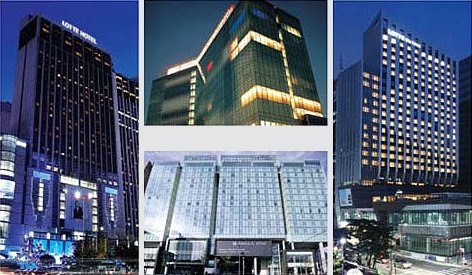Luxury Hotels Struggle as Japanese Stay Away
Published on | Source
Luxury hotels here are struggling as profits dwindle amid a marked decline in high-rolling Japanese customers.
Advertisement
Lotte Hotel, the biggest hotel chain in Korea, saw operating profit fall by half last year to W24.3 billion (US$1=W1,071). Hotel Shilla, a favorite choice of visiting foreign dignitaries and heads of state, posted an operating loss of W20.6 billion last year.
The W Seoul Walker Hill Hotel on the eastern edge of Seoul, a popular destination for foreign tourists, earned a paltry W12 million in net profit last year. Shinsegae, which operates luxury hotels in downtown Seoul and the southern port city of Busan, saw operating profit fall to W4.1 billion last year, less than half of what it earned in 2013.
From 2009 to 2012, the number of Japanese visitors rose from 3 million to 3.52 million, but it fell to a 10-year low of 2.28 million last year as Seoul-Tokyo relations chilled and a weak yen made Korea more expensive.
Instead, the number of Chinese tourists soared from 710,000 in 2005 to 6.13 million last year, but they prefer to more affordable accommodation, such as business hotels or guest houses.
"A majority of five-star hotels have seen a 30-percent decline in the number of Japanese guests. In some hotels the number fell 50 percent, while the increase in Chinese guests has been minimal", one luxury hotel staffer said.
Also impacting the bottom line, particularly in Busan and Jeju, is a decrease in the number of Korean guests, who now travel to Japan to take advantage of the weak yen.
A growing number of five-star hotels are advertising rooms at rock-bottom prices online, which was unheard of just one to two years ago. Hotel booking websites now feature major five-star hotels at more than 40 to 50 percent discounts from usual prices.
Hotels have high fixed costs since they have to maintain and air-condition rooms even when they are empty.
Competition is heating up to attract local customers. Attempts include package deals for family and friends and even overnight stays for expecting mothers. Westin Chosun has come up with a special menu for breakfast or lunch meetings.
Other hotels are trying to emancipate themselves from their reliance on Japanese tourists. Lotte Hotel has bolstered marketing efforts to attract Middle Eastern tourists to its duty-free shops and amusement park. The Ritz Carlton provides prayer carpets for Muslim guests.
Lee Hoon at Hanyang University said, "If five-star hotels are to achieve stable growth, they need to go beyond their reliance on Japanese and Chinese tourists and attract Southeast Asian and Middle Eastern guests as well as coming up with package deals and promotions".
